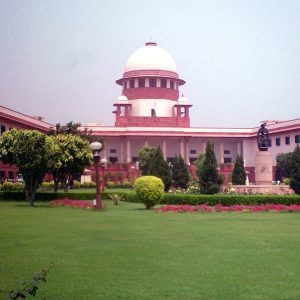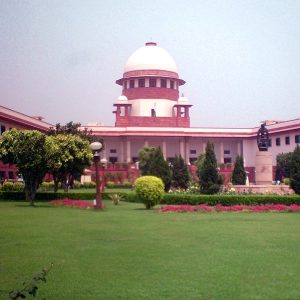 by Saroj Giri (Nov 01, 2022)
by Saroj Giri (Nov 01, 2022)

The Supreme Court of India, photographed about 170 metres from the main building outside the perimeter wall. By Legaleagle86 at en.wikipedia, CC BY-SA 3.0, Link.
In “Before the Law,” Franz Kafka portrays a countryman who can only be forever “before the law,” but never entering. “It is possible” to gain entry, says the doorkeeper, “but not at the moment.” The man gets old and is about to die—and only now does he understand that the gate was meant for him! “No one else could ever be admitted here, since this gate was made only for you. I am now going to shut it.”
Kafka takes us to the interplay of surplus investment and lack in our relationship with the law, which propels a spiral of activity approximating a goal that perpetually recedes into the future. At the very least, Kafka suggests that the law into which the protagonist is seeking entry might not be what he thinks it is. Law is a self-referential bubble without concrete determinations of any kind. Jacques Derrida was right when he pointed out Kafka’s message: “To be invested with its categorical authority, the law must be without history, genesis or any possible derivation.”1
This can remind us, as Evgeny Pashukanis shows, how Karl Marx held that under conditions of commodity exchange, social relations tend to take the form of juridical relations. The principle of equivalence in the “commodity form” is inseparable from the equivalence underlying “equality of all” before law in a democracy. Juridical relations are not really an abstraction from social relations, but the form of appearance of the social relations.2
Law’s categorical authority, combined with its abstraction, generates a lack-driven over-investment in the imagined future and freedom—futuristic freedom—homologous to the futuristic movements of capitalist accelerationism.3 Progressive-left politics is ensnared by this futurism, which is bent on the erasure of the past, which is considered to be by definition regressive. Let us not forget that futurism, as it first came through the pen of Filippo Tommaso Marinetti in Italy in the 1910s, subsequently influenced fascism, and not least the communist avant garde of the time. Against this futurism-fascism nexus, we can find the works of those like Walter Benjamin and Pier Paolo Pasolini.4
Bhima Koregaon is that rare sequence in Indian politics today that can challenge this much-vaunted futurism and reveal the true powers of being able to retroactively “change the past” in order to liberate the future, much in the manner of Marx’s historical materialism. Caste oppression as inseparable from the question of the past is imbricated in the modern spiral of surplus and lack enunciated by the law, sovereign violence, and the logic of capital. Bhima Koregaon is, in terms of its empirics, so loaded with historical memory and the legacy of caste oppression that the so-called progressive left would rather take cover in the past-erasing, rarefied realms of the futuristic non-world of the constitution and the rights and innate liberties it supposedly guarantees to all citizens. Before the law, any day!5
Look at the manner in which the Bhima Koregaon case is playing out between the state and activists. The prosecution is touting the conspiracy angle: that activists, in coordination with Maoists, were conspiring to overthrow the Indian state. The defense is in turn seeking to challenge this by invoking the constitutional rights and liberties (Articles 19 and 20) of the accused. The main line of defense is that there is no evidence to suggest that the activists were in any way involved in such a conspiracy. Those mounting the defense include activists, lawyers, and civil society dissenters, some of whom can be said to share strong affinities with those Catherine Liu, in a very potent expression, calls “virtue hoarders.”6
@MROnline


